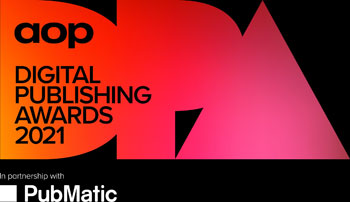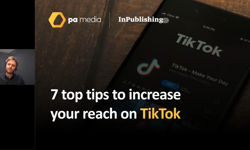
Q: What have been the main advances in consumer publishing over the past twelve months?
Hayley: With so much uncertainty dominating the past year, publishers have had to be incredibly resilient and creative to stay relevant and succeed. Covid has forced us to accelerate our strategies around revenue diversification to offset any declining advertising spends. A lot of this focus has been on reader revenue, subscriptions and ecommerce. We are now also experiencing a lot more collaboration with other publishing partners – which can only be a positive thing!
Q: What have been the main advances in B2B publishing over the past twelve months?
Robin: Definitely it’s the shift to digital events. At our 2020 strategy session in January last year, we were firmly of the opinion that 2020 was going to be a year of major event growth. This clearly didn’t happen as planned, and the shift to digital events tested our appetite for innovation to the limit, and forced us to accelerate existing plans like our Deskflix series of digital events, plus a complete re-evaluation of our event partnerships.
For our tech brands, we experienced a major spike in demand for our lead-gen products – probably driven by the demand spike for tech products as firms reset for remote working. This allowed us to really raise our game in this channel, including the launch of a new account based marketing (ABM) product to allow us to compete more effectively.
Video was huge for us in 2020, both to power our digital events and in terms of native products. It’s an area we continue to invest in and one where there’s ongoing demand across the board. It’s clearly the future for us.
Finally, it’s important to keep an eye on the day-to-day stuff. Quality journalism is so important to power our brands and it’s as urgent as ever to give our users the information that informs and educates them to make the right decisions.
Q: This year’s awards include a new category ‘Best Publisher-led Social Good Initiative’. Diversity and inclusion have obviously been hot topics over the last twelve months. Why do you think it’s particularly important for publishers to focus on these issues?
Hayley:
Publishers are in an incredibly strong position with voices and platforms that can influence real change. I’m particularly proud of how we have used our position to drive some amazing initiatives, like setting up the Mail Force charity last year to source and provide valuable PPE equipment for hospitals and care homes, and more recently is helping to supply computers for kids and schools that need them most. It has now raised over £23million which is incredible.Highlighting important issues is so vital. A diverse and inclusive workplace is particularly important because it makes everyone, regardless of who they are or what they do, feel equally involved and supported. It comes down to empowering everyone in your organisation to do their best no matter what their department, ethnicity, background, gender or role is. Encouraging everyone to have their voices heard makes for better decisions, fosters a culture of creativity and innovation, enables a deeper understanding of a workforce and how each department, team and individual feels. This makes for a higher performing business from a revenue, innovation and employee retention perspective.
Robin: It’s simply the right thing to do, both from a social responsibility perspective and from a business perspective. We want our people to know that we take diversity and inclusion very seriously because they tell us it is something that motivates and drives them. And we want to respect the deep social and ethnic diversity of our home city, London. We need to reflect this in our products and our recruitment. I’m incredibly proud that our ‘Women In…’ strand of events has been so successful and that we are recognised as leading the way in promoting diversity to our financial services and technology sectors.
Q: What main content trends have you noticed over the past twelve months?
Hayley: One huge upside for us as a publisher, is that traffic to our digital sites has increased on average +31% year-on-year across all of our platforms. Unsurprisingly, we experienced huge traffic spikes during the peak of the pandemic – particularly on MailOnline every day after 5pm following Boris Johnson’s daily press conferences…
Thankfully though, our audiences haven’t just been clicking on Covid content. Practical advice continues to be in high demand, as we’ve seen 52million article views on stories starting with ‘how do’ or ‘how to’! Home is obviously where the heart is, as people continue to seek inspiration for DIY and gardening.
And in the early lockdown days, positive content on the efforts of key workers was particularly popular, alongside brands revealing recipes or offering special services to customers. During that time, traffic to Sport, Showbiz and Travel verticals obviously fell significantly, but we’re pleased to see these have now recovered. We’re confident this will continue as we get back to some sort of normality!
Robin: Dare I mention video again, plus, of course, podcasts and long-form content. Our switch to digital events has allowed us to appreciate that event content – speaker sessions, etc – is important to our users and we have been able to join the dots between events and editorial to reflect this kind of content in our magazines and websites.
As mentioned above, quality editorial isn’t a goal, it’s a given, particularly in a year of ‘alternative facts’ like 2020. I’m deeply proud of the content our journalists and event producers create, whether it’s print, digital or video.
Q: What main commercial trends have you noticed over the past twelve months?
Hayley:
Publishers have had to be incredibly flexible and creative in order to support advertisers and help them navigate such a difficult time. Being proactive and sharing relevant insights to help clients understand consumer sentiment and how to communicate with people has been key.With rules changing so frequently, the market became very short term so publishers have had to adapt fast and deliver proposals with very short turnaround times. We have had to be flexible with deadlines, help clients with creative production and adaption. And we’ve seen a big swing back to direct sold advertising – we’re encouraged that this trend has remained too.
Publishers and tech partners like SSPs and DSPs have also had to come together to seek out new revenue opportunities. They’ve needed to educate buyers about the importance of news content and the value of the audience they’d be missing by blanket blocking.
Robin: A lot less print revenue after a couple of years of modest increases, less demand from our asset management and pension clients for event sponsorships – but conversely high demand from our technology clients. Tech lead gen revenue was extremely robust, as was digital advertising revenue. The main hole was from event revenue, which we weren’t able to replicate 100% in a digital environment – after all it’s tough selling awards tables at a ceremony when the event is on your laptop.
Q: When it comes to submitting award entries, do you have any dos and don’ts?
Hayley:
Do:
- Be honest and authentic: let your passion come through in the entry.
- Take pride in highlighting what’s so incredible about your story and include visuals where necessary to bring it to life. Inspire the judges and keep them engaged throughout.
- Keep it short, sharp and easy to understand.
- Make sure there is evidence to quantify the results and use meaningful metrics!
- If you aren’t successful, learn from this experience and try again.
Don’t:
- Go in half-hearted: submitting an award entry takes time, commitment and thought.
- Go off-piste: answer the brief, respond to every question and stick to the word count.
- Exaggerate the truth: it’s important to submit honest results!
- Overcomplicate it: make it easy to understand.
Robin:
Do:
- Read the entry criteria.
- Keep it simple.
- Use real financials, not percentages. We can all spot porky pies from 100 paces.
- Tell a story; if it’s a good one, you stand a real chance of winning.
- Provide testimonials: they carry so much power and can be a challenge to get hold of, so they reflect a real determination for the entry to go the extra mile.
Don’t:
- Waffle: it’s not an exercise in creative writing.
- Provide too much supporting material, the judges haven’t got time to read it.
Q: When someone wins a major industry award, like an AOP award, what do you suggest they do to make the most out of their prize?
Hayley: First of all, celebrate it! Winning an award is a big deal. We might not be celebrating in real life at awards ceremonies right now but make sure you mark the occasion with your team somehow.
Then PR it! Use it in your commercial sales narrative and include it in pitches to other clients. It’s a success story and something to be proud of.
Robin: Celebrate it hard, on social media, on your corporate comms, tell your clients and include it in media packs. Everyone likes to do business with an award winner, and it does wonders for staff morale. We are incredibly proud of all our award wins, and disappointed when we miss out (ask Richard Reeves). And the buzz on the night is unforgettable.
Hayley Cochrane is Head of Digital at Mail Metro Media and Robin Shute is Operations Director at Incisive Media. They are co-chairs of the judging panel for the AOP Digital Publishing Awards 2021.

Entry for the AOP Digital Publishing Awards 2021 is now open. The entry deadline is 6 May.










